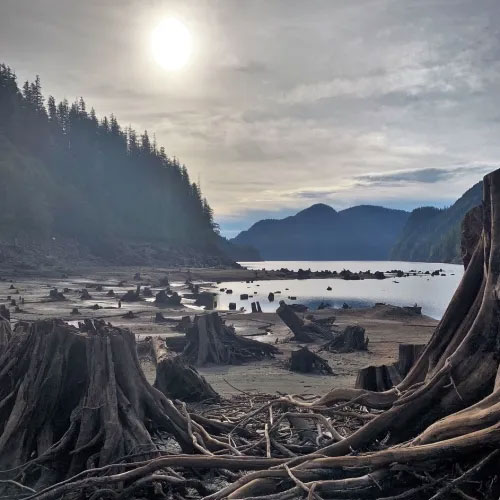Photo by Jeremy Bynum. |
The Alaska Center for Climate Assessment and Policy (ACCAP), a NOAA funded program at the University of Alaska Fairbanks International Arctic Research Center, hosted a workshop at the end of March to address these events. Alaska Sea Grant’s Coastal Community Resilience Specialist, Davin Holen, led the effort, together with representatives from ACCAP, Alaska EPSCoR, the Alaska Coastal Rainforest Center, University of Alaska Southeast, National Weather Service Juneau, The Central Council of Tlingit and Haida Indian Tribes, and the Northern Latitudes Partnership.
The goal of the March 2022 workshop was to build on the foundation of knowledge and information gained since 2019 and to assist with the development of community-driven adaptation strategies that serve the specific needs, challenges and opportunities of remote communities. The workshop covered topics including weather and climate, streams and salmon, freshwater and marine environments, the forest environment, and socioeconomics. Participants learned about recent research and decision support tools relevant to their adaptation planning needs. Ultimately, the workshop sought to create a list of specific adaptation strategies communities can implement.
A final workshop report summarizing the resources and tools available and appropriate for adaptation planning in Southeast Alaska will be released later this year. The report will also include recommendations for future products and research. It will be available on the ACCAP website, through the Northwest Climate Hub, the Southeast Sustainable Partnership, and on the collaborative Adapt Alaska website hosted by Alaska Sea Grant.
Holen noted, “The workshop provided the chance to come together as a community in conversations that will lead to further collaborations among researchers, agencies, tribes, and community entities. By bringing together a wide variety of stakeholders in Southeast Alaska to develop adaptation strategies, we are able to harness a diversity of thought, knowledge, and experience to develop solutions that will have local applicability and support, and thus will be more likely to succeed.”
https://alaskaseagrant.org/author/agore2/
ANNE GORE is a member of the University of Alaska's Sea Grant team as a writer and communications person. Alaska Sea Grant receives federal funding from the National Sea Grant Program |
Representations of fact and opinions in comments posted are solely those of the individual posters and do not represent the opinions of Sitnews.
Send a letter to the editor@sitnews.us
SitNews ©2022
Stories In The News
Ketchikan, Alaska
Articles & photographs that appear in SitNews are considered protected by copyright and may not be reprinted without written permission from and payment of any required fees to the proper freelance writers and subscription services.
E-mail your news & photos to editor@sitnews.us
Photographers choosing to submit photographs for publication to SitNews are in doing so granting their permission for publication and for archiving. SitNews does not sell photographs. All requests for purchasing a photograph will be emailed to the photographer.

